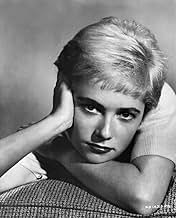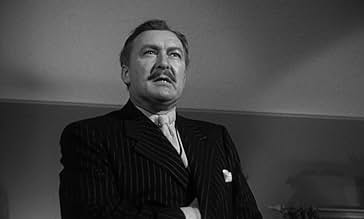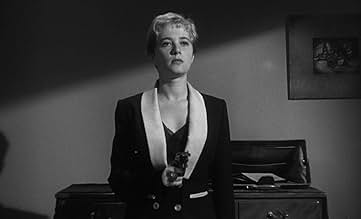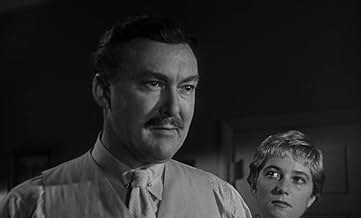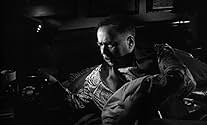VALUTAZIONE IMDb
7,5/10
22.563
LA TUA VALUTAZIONE
Una condanna femminile autostoppista trascina Mike Hammer in un micidiale vortice di intrighi, ruotando attorno a una misteriosa "grande cosa".Una condanna femminile autostoppista trascina Mike Hammer in un micidiale vortice di intrighi, ruotando attorno a una misteriosa "grande cosa".Una condanna femminile autostoppista trascina Mike Hammer in un micidiale vortice di intrighi, ruotando attorno a una misteriosa "grande cosa".
- Premi
- 1 vittoria e 1 candidatura
Marian Carr
- Friday
- (as Marion Carr)
Mady Comfort
- Nightclub Singer
- (as Madi Comfort)
Trama
Lo sapevi?
- QuizThe Kefauver Commission, a federal unit dedicated to investigating corrupting influences in the 1950s, singled this out as 1955's number one menace to American youth. Because of this, Robert Aldrich felt compelled to conduct a writing campaign for the free speech rights of independent filmmakers.
- BlooperAt the beginning, Christina (Cloris Leachman) is shown running at the side of the highway, but the shots of only her feet show her running along the painted center line of the highway.
- Citazioni
Mike Hammer: You're never around when I need you.
Velda: You never need me when I'm around.
- Curiosità sui creditiThe opening credits scroll down instead of the usual up, resulting in needing to read them bottom to top.
- Versioni alternativeUntil 1997, all known copies in circulation of "Kiss Me Deadly" ended rather abruptly: the wounded Mike Hammer stumbling through the beach house looking for his partner Velda, and then there's a couple of brief shots of the house exploding and burning, with "The End" superimposed on the final shot. The music is cut off instead of fading out, and the screen turns black; it looks like Mike and Velda died in the blaze.
- ConnessioniEdited into American Cinema: Film Noir (1995)
- Colonne sonoreRather Have the Blues
Sung by Nat 'King' Cole
Written by Frank De Vol (uncredited)
[Played on the car radio during the opening title card and credits]
Recensione in evidenza
If The Maltese Falcon (1941) was the definitive true detective movie, The Big Sleep (1946) the definitive glamourized detective movie, and Chinatown (1974) the definitive allegorical detective movie, then Kiss Me Deadly is the definitive sleazy detective movie.
Mickey Spillane's sadistic private eye Mike Hammer, turned from successful private eye to sleazy bedroom dick, is the quintessential anti-hero, doing just about anything and everything wrong to get a piece of the pie that the characters call "The Big What's-it."
The movie survives by giving the usual Spillane buckets-of-blood story and its protagonist new dimensions. Right from the electric opening scene and the audacious opening credit sequence, the audience is drawn into Hammer's seedy world, where morality is suspended, and the credo of the end justifying the means dominates Hammer's actions. His reckless abandonment is almost never questionned and the film seems to understand his brutality as what he must do to get the job done in an equally brutal world.
Director Robert Aldrich observes all of it with an objective eye that neither glorifies nor condemns the action on-screen, letting the audience draw its own conclusions--even where the plot is concerned. The pace is unrelentless and the plot turns are never fully explained, forcing the audience to participate willingly in all that Hammer does to, hopefully, see the story through to its ending.
And what an ending! I'd de damned to a special place in Hell if I elaborated, so I'll just say that it's one of the greatest I've ever seen. That goes same for the movie itself, which is one of the most stylish, jarring and truly entertaining movies of its genre.
Mickey Spillane's sadistic private eye Mike Hammer, turned from successful private eye to sleazy bedroom dick, is the quintessential anti-hero, doing just about anything and everything wrong to get a piece of the pie that the characters call "The Big What's-it."
The movie survives by giving the usual Spillane buckets-of-blood story and its protagonist new dimensions. Right from the electric opening scene and the audacious opening credit sequence, the audience is drawn into Hammer's seedy world, where morality is suspended, and the credo of the end justifying the means dominates Hammer's actions. His reckless abandonment is almost never questionned and the film seems to understand his brutality as what he must do to get the job done in an equally brutal world.
Director Robert Aldrich observes all of it with an objective eye that neither glorifies nor condemns the action on-screen, letting the audience draw its own conclusions--even where the plot is concerned. The pace is unrelentless and the plot turns are never fully explained, forcing the audience to participate willingly in all that Hammer does to, hopefully, see the story through to its ending.
And what an ending! I'd de damned to a special place in Hell if I elaborated, so I'll just say that it's one of the greatest I've ever seen. That goes same for the movie itself, which is one of the most stylish, jarring and truly entertaining movies of its genre.
I più visti
Accedi per valutare e creare un elenco di titoli salvati per ottenere consigli personalizzati
Dettagli
- Data di uscita
- Paese di origine
- Lingue
- Celebre anche come
- Kiss Me Deadly
- Luoghi delle riprese
- Clay Street, Bunker Hill, Downtown, Los Angeles, California, Stati Uniti(Mike parks his Corvette and takes the back steps up to the Hillcrest Hotel)
- Azienda produttrice
- Vedi altri crediti dell’azienda su IMDbPro
Botteghino
- Budget
- 410.000 USD (previsto)
- Lordo Stati Uniti e Canada
- 726.000 USD
- Lordo in tutto il mondo
- 952.000 USD
- Tempo di esecuzione1 ora 46 minuti
- Colore
- Proporzioni
- 1.85 : 1
Contribuisci a questa pagina
Suggerisci una modifica o aggiungi i contenuti mancanti

Divario superiore
By what name was Un bacio e una pistola (1955) officially released in India in English?
Rispondi



